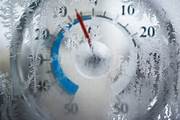
MEDIA RELEASE
From the Office of the Commissioner of Health, Dr. Gale Burstein
Date January 5, 2014
CONTACT: Mary C. St. Mary/Mary.StMary@Erie.Gov
Phone: 716.858.4941/ Mobile: 716.253.3925
2015 Ushers in Extremely Cold Weather
Bitter Wind Chills Expected to Last Several Days
ERIE COUNTY, NY-- The Erie County Department of Health (“ECDOH”) reminds everyone to take appropriate precautions during this week’s arctic cold temperatures. “Staying warm can be a challenge when temperatures are this low and are accompanied with a significant wind chill that makes it feel colder,” said Erie County Health Commissioner Dr. Gale Burstein. “Prolonged exposure to cold temperatures can cause serious or life-threatening health problems. Anyone can be affected, but infants and the elderly are particularly at risk. Keep yourself and your family safe and prevent cold weather-related health problems by being aware of the weather conditions to plan and dress appropriately.”

Cold weather causes muscles to lose more heat and contract, causing tightness throughout the body. Joints get tighter, muscles can lose their range of motion and nerves can more easily be pinched. As wind speeds increase, heat can leave your body more rapidly. If at all possible, try to stay indoors. Make any trips outside as brief as possible and follow these tips to protect your health and safety:
- Outer layer of clothing should be tightly woven, preferably of wind resistant fabric, to reduce body-heat loss caused by wind.
- Inner layers of clothing consisting of wool, silk, or polypropylene will hold in more body heat than cotton.
- Stay dry; wet clothing chills the body rapidly.
- Excess perspiration will increase heat loss, so remove extra layers of clothing whenever you feel too warm.
- Do not ignore shivering as it is an important first sign that the body is losing heat. Persistent shivering is a signal to return indoors.
- Uncontrollable shivering can be an indicator of hypothermia, when the body’s core temperature drops below normal. Other symptoms include slow speech, memory lapses, frequent stumbling and drowsiness.
- Frostbite is a severe reaction to cold exposure that can cause permanent damage. Symptoms include a loss of feeling and a white or pale appearance in fingers, toes, ears and nose.
If frostbite or hypothermia is suspected, slowly warm the victim and seek immediate medical attention.
Children lose body heat more rapidly than adults. They need to be dressed warmly and closely monitored while outdoors in extreme cold as they may not be able to effectively communicate their coldness to adults. Take similar precautions with your pets; do not leave them outdoors or in an unheated vehicle for any length of time.
Cold weather puts an extra strain on the heart. If you have heart disease or high blood pressure, follow your doctor’s advice about shoveling snow or performing any strenuous work in the cold. If you have to do heavy outdoor chores, dress warmly and work slowly. Remember, your body is already working hard just to stay warm, so be careful not to overdo it.
For more information
Erie County – http://www2.erie.gov/seniorservices/index.php?q=emergency-preparedness
New York State Department of Health -- http://www.health.ny.gov/environmental/emergency/weather/cold/cold_weather_tips.htm
Centers for Disease Control and Prevention “Extreme Cold Guide” -- http://www.bt.cdc.gov/disasters/winter/guide.asp
SPCA Serving Erie County “Winter Pet Safety Tips” -- https://www.yourspca.org/sslpage.aspx?pid=583
American Red Cross “Cold Weather Safety Tips for You and Your Pets” -- http://www.redcross.org/news/article/Cold-Weather-Safety-For-You-And-Your-Pets

